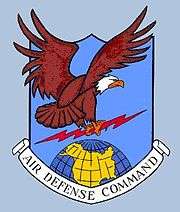Washington Air Defense Sector
Washington Air Defense Sector
 | |
|---|---|
|
Emblem of the Washington Air Defense Sector | |
| Active | 1956–1966 |
| Country | United States |
| Branch |
|
| Role | Air Defense |
| Part of | Air Defense Command |


The Washington Air Defense Sector (WaADS) is an inactive United States Air Force organization. Its last assignment was with the Air Defense Command (ADC) 26th Air Division, being stationed at Fort Lee Air Force Station (AFS), Virginia. It was inactivated on 1 April 1966.
History
WaADS was established in December 1956 as the 4625th Air Defense Wing.[1] It was not assigned any units until 1958 when it assumed control of former ADC Eastern Air Defense Force units primarily in Maryland, Delaware, and Virginia.[2] Units of the 32d Air Division in North and South Carolina were transferred to WaADS in 1961 as the 26th Air Division area of responsibility expanded southward.[3] The organization provided command and control over several aircraft, missile and radar squadrons.
On 1 February 1959 the new Semi Automatic Ground Environment (SAGE) Direction Center (DC-04) became operational. 37°15′09″N 077°19′21″W / 37.25250°N 77.32250°W DC-04 was equipped with dual AN/FSQ-7 Computers. The day-to-day operations of the command were to train and maintain tactical units flying jet interceptor aircraft (F-101 Voodoo; F-102 Delta Dagger; F-106 Delta Dart) or interceptor missiles (CIM-10 Bomarc) in a state of readiness with training missions and series of exercises with Strategic Air Command and other units simulating interceptions of incoming enemy aircraft.
The sector was eliminated on 1 April 1966 due to a general reorganization of Air Defense Command, most of its assigned units being reassigned to the 33d Air Division
Lineage
- Designated as 4625th Air Defense Wing, SAGE and organized on 1 December 1956
- Redesignated Washington Air Defense Sector on 8 January 1957
- Discontinued and inactivated on 1 April 1966
Assignments
- 85th Air Division, 1 December 1956
- 26th Air Division, 1 September 1958 – 1 April 1966
Stations
- Fort Lee AFS, Virginia, 1 December 1956 – 1 April 1966
Components
Interceptor squadrons
- Langley Air Force Base (AFB), Virginia, 1 September 1958 - 1 April 1966
- Andrews AFB, Maryland, 1 September 1958 - 1 July 1963
- Charleston AFB, South Carolina, 1 July 1961 - 1 April 1966
- Seymour Johnson AFB, North Carolina, 1 July 1961 - 1 October 1965
Missile squadron
- 22d Tactical Missile Squadron (BOMARC)[12]
- Langley AFB, Virginia, 1 September 1959 - 1 April 1966
Radar squadrons
|
|
Weapons Systems
- F-101B 1961-1966
- F-102A, 1958-1965
- F-106A, 1959-1966
- IM-99 (later CIM-10), 1959-1966
See also
- List of USAF Aerospace Defense Command General Surveillance Radar Stations
- Aerospace Defense Command Fighter Squadrons
- List of MAJCOM wings
- List of United States Air Force aircraft control and warning squadrons
Notes
- ↑ Cornett, Lloyd H; Johnson, Mildred W (1980). A Handbook of Aerospace Defense Organization, 1946-1980 (PDF). Peterson AFB, CO: Office of History, Aerospace Defense Center. p. 65.
- ↑ Cornett & Johnson, p. 31 (Map)
- ↑ Abstract, History of 26th Air Div, Jan-Jun 1961 (accessed 6 Feb 2012)
- ↑ Maurer, Maurer, ed. (1982) [1969]. Combat Squadrons of the Air Force, World War II (PDF) (reprint ed.). Washington, DC: Office of Air Force History. p. 209. ISBN 0-405-12194-6.
- ↑ Cornett & Johnson, p. 116
- ↑ Maurer, p. 318
- ↑ Cornett & Johnson, p. 121
- ↑ Maurer, p. 550
- ↑ Cornett & Johnson, p. 128
- ↑ Maurer, p. 580
- ↑ Cornett & Johnson, p. 129
- ↑ Cornett & Johnson, p. 150
- 1 2 Cornett & Johnson, p. 154
- 1 2 Cornett & Johnson, p. 157
- ↑ Cornett & Johnson, p. 162
- 1 2 Cornett & Johnson, p. 166
- 1 2 Cornett & Johnson, p. 170
References
![]() This article incorporates public domain material from the Air Force Historical Research Agency website http://www.afhra.af.mil/.
This article incorporates public domain material from the Air Force Historical Research Agency website http://www.afhra.af.mil/.
- Leonard, Barry (2009). History of Strategic Air and Ballistic Missile Defense (PDF). , Vol II, 1955-1972. Fort McNair, DC: Center for Military History. ISBN 9781437921311.
- Redmond, Kent C.; Smith, Thomas M. (2000). From Whirlwind to MITRE: The R&D Story of The SAGE Air Defense Computer. Cambridge, MA: MIT Press. ISBN 978-0-262-18201-0.
- Winkler, David F.; Webster, Julie L (1997). Searching the skies: The legacy of the United States Cold War Defense Radar Program (PDF). Champaign, IL: US Army Construction Engineering Research Laboratories. LCCN 97020912.
- Photos of Washington Air Defense Sector SAGE facilities

